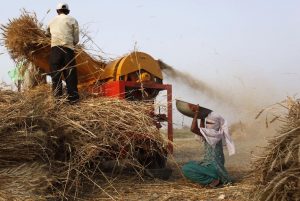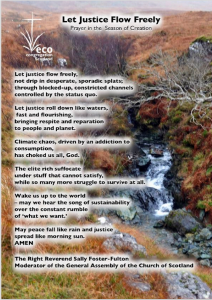Nerys writes: During the last four weeks we’ve been finding out what we could do to help stop Climate Change and to support the people who are worst affected by the climate crisis. Today, as we give thanks to God for this year’s harvest and for all the good things we enjoy, our readings encourage us to consider how we are going to respond to what we have learnt.

We start with another instalment from the story of Moses and the people of Israel, Exodus 17.1-7. The people had been led by God out of slavery in Egypt. They had been guided by a pillar of smoke by day and fire by night. God had parted the Red Sea so that they could escape and drowned their enemies. In the wilderness when they were hungry, God provided amazing food for them. When the water was too bitter to drink, God provided sweet water. In today’s episode, they are again thirsty and God provides water out of a rock. You would have thought the people would be thankful. But, oh no, whenever things don’t go their way, they complain and grumble and threaten poor Moses. ‘Why did you bring us out of Egypt if we’re to die here? God is obviously not with us, otherwise we wouldn’t be suffering like this.’ Not once do they praise God. Not once do they give thanks.
When things go wrong for us, it’s natural to look for someone to blame, rather than take responsibility for the situation. It’s easy to catastrophise rather than count our blessings. Time and time again, God had shown the people of Israel that he was with them, that he would provide for them. Time and time again, the people lose their trust in God. Instead of following Moses’ example, listening for God’s voice and following God’s instructions, they spend their time grumbling and complaining.
In today’s Gospel, Matthew 21.23-32, the chief priests and elders weren’t listening for God’s voice or following God’s instructions either. They were too busy trying to catch Jesus out with their trick questions. But Jesus ties them up in knots with their own words and they end up looking very foolish. Then he tells them the story of the two brothers who are asked by their father to work in his vineyard. The parable ends with a question, ‘Which one of the two did what his father wanted?’
I wonder how you would have answered Jesus’ question? Was it the one who said no at first but then changed his mind? Or was it the one who seemed very willing but who didn’t follow his polite words with action?
‘It was the first son, of course,’ said the chief priests and the elders, thinking they were very clever. ‘Well, ’ said Jesus, pointing to some people at the edge of the crowd, ‘if that is so, these tax collectors and other outsiders will be in God’s kingdom before you’. Those people had made wrong choices. They had refused to listen to God and follow God’s instructions, but, unlike the religious leaders, when Jesus came among them, they set about making changes to their lives.
God is calling us to make changes to our lives out of love for our planet and for people who are suffering because of climate chaos. How will we respond? Will we show willing, using the right words but not actually do anything or will we put our trust in God into action?
May we be inspired by the prayer below composed by Rt. Revd. Sally Foster-Fulton for this year’s Season of Creation.







